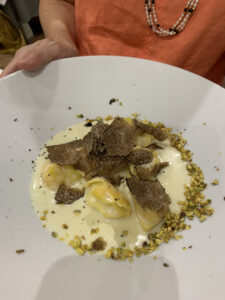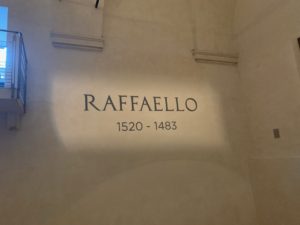
I can’t even begin to tell you how shocked and frustrated and sad Virginia and I were when, as we were about to have breakfast on the morning of June 8th, 2018. I opened up the NYT and there was the headline: “Anthony Bourdain, Renegade Chef Who Reported From the World’s Tables, Is Dead at 61.” Cause: suicide. WTF?? When I read this aloud, Virginia just looked at me in utter disbelief. It simply couldn’t be true, but there it was. You know, it’s been almost 2 years since his death and we are still filled with frustration and sorrow that he’s gone. Earlier the week, we watched a couple of episodes of “Parts Unknown” and Virginia almost cried. She told me she’s still angry at Bourdain. “How could he have killed himself?” Why?
Restaurants from the Inside
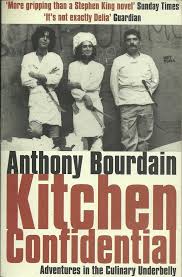
Anthony Bourdain actually appeared on my radar in 2000 when a good friend recommended I read his raw, unedited insider’s view of the restaurant business, “Kitchen Confidential.” Not only was I blown away by his accurate reporting of what happens in professional kitchens, but he was also an excellent story teller. As someone who worked his way through high school and college as a cook and then spent time in some pretty good restaurants in Seattle, I knew a thing or two about restaurants. One of the most important ideas that he discusses is the fact that working in a kitchen is strictly blue-collar. It’s hard, relentless and low-paid work. Indeed, that was my experience. Often, you worked with people who had drug or alcohol problems or who were living alternative lifestyles or simply weren’t having a good life. In the food business, people come and go. It’s not a glamor job, no matter how many celebrity chefs you see on TV.
Let’s just say, I felt as if I knew Anthony personally after having worked in the business for about 12 years. I clearly remember the day I knew I wasn’t going to continue working as a cook during a brutal Sunday brunch at Cafe Sport in Seattle. The sous chef looked over at me as we slaved over the stove-top burners, sweat pouring from the both of us and asked “hey James, we gonna be doing this when we’re in our 40’s?” I knew then that I wasn’t long for the profession. The truth is, I love to cook and I was an accomplished kitchen professional in those days. But I knew doing it for the rest of my life was not going to happen.
I thought a lot about Bourdain’s stories. He actually confirmed a lot of my conflicted feelings about working as a cook. It’s a thankless job, but there’s huge satisfaction at the end of a tough shift that you did a good job and made people happy by producing high quality dishes. It’s one of the only “artistic” talents I possess.
Then Bourdain Became Real
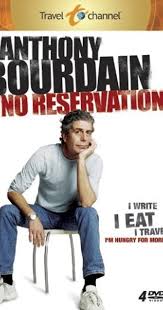
Then, in the summer of 2005, a miracle happened. Kitchen Confidential and Anthony Bourdain came to life when he launched the TV series, “No Reservations.” This program ran from 2005-2012. It became clear from the start that this was not just a “foodie” show. Bourdain’s brash, overly-opinionated, New Jersey personality was a bit hard to stomach at first, but then it became crystal clear that he really cared about what he was doing, where he was traveling, with whom he was engaging. He and his film crew were masters of bringing us to places in a way that no chef or travel celebrity had before. I have to say that No Reservations is top-notch TV. But then came:
The Best TV Ever
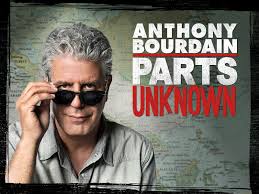
I consider Parts Unknown to be some of the best TV of its kind, ever. Airing from 2015-2018 in 12 short seasons, Anthony Bourdain created incredibly interesting, engaging and provocative travel stories. Food was definitely part of the experience, but more often than not, I found myself totally swept away by his ability to put me right, smack dab in the history, culture, politics or economics of a place. He went out of his way to visit controversial countries such as Iran or Myanmar. He could make a place like Sicily, one of the most overly exposed, stereotyped places in the world seem fresh and interesting. He could also tell us, point blank, what he hated. Such candor is rare these days but his criticisms were often founded in a huge amount of international (and national) travel experience. But just as often, his empathy and concern for other humans was genuine which was why I loved watching his show, and, well I loved him too! Lot’s of people loved Anthony Bourdain.
I want to end this by saying that no matter how hard it is to go back and re-watch an episode of Parts Unknown or No Reservations, Anthony Bourdain set the bar incredibly high when it came to story telling. He could speak eloquently about food. He appreciated the unfamiliar. He loved when old grandmothers “adopted” him during great meals. He also had a way of asking tough questions about uncomfortable things, a quality that people appreciated. He would also joyously tell us that something “definitely does not suck” when he liked it! He did it his way, with gusto, with force and with a creativity that few in the business can match.
